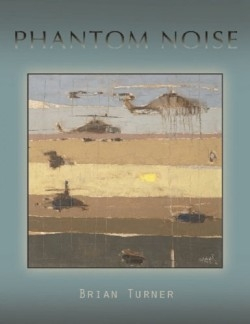Phantom Noise
- 2010 INDIES Winner
- Bronze, Poetry (Adult Nonfiction)
Brian Turner’s inventory of a year in Iraq includes: desert boots, body armor, “nights spent staring for heat signatures through the white-hot lens.” Also: dead infants, boredom, “A bullet carrying the middle vowel of the word Inshallah.” This is Turner’s second book—his bestselling 2005 release, Here, Bullet, was also about his Iraq experiences. Staring hard through a calibrated sight, this former infantry team leader recounts what he has witnessed: harrowing events and a daily life far from what is fathomable for most readers. Still, he reveals the particular music of death and violence and military service, and these poems unfold with his effort to find meaning, to be decent, and to be alert to the suffering all around.
The books’ title poem, “Phantom Noise,” explains: like phantom pain—an irrational ache felt in a limb even after it has been severed from the body—there is a noise behind the language, a sound for what he’s seen and what it is to be at war. “There is this ringing hum this / bullet-borne language ringing / shell-fall and static this late night.” No propaganda, no talking points; instead, here is a grown man and his tenderness toward what is hurt and what is destroyed, whether it is American or Iraqi, or the unidentified woman he digs out from a mass grave. There are a number of non-war poems, too; there are even some poems in which the soldier returns to being a man among women, a lover, a reader. But he is mostly a warrior poet, “driving until I finally understand / who it is I’m supposed to kill.”
The men who appear in these poems are not heroes; they are more complicated than that. Private Reynolds, six weeks shy of deployment, “white knuckles the cord” that will kill his wife. Stoltman dips his wrists in fuel and lights a Zippo when paperwork arrives asking for a divorce. A Sergeant haunts the night hours of the female soldier he sexually assaulted, and a VA doctor removes shrapnel from an old wound, “fragments / of the war inscribed in scar tissue, / a deep, intractable pain, the dull grief of it / the body must learn to absorb.” And, since this landscape is already inconceivable in so many ways, Turner will wipe sweat from the brow of a laboring woman because “She is giving birth in the middle of war— / the soft dome of a skull begins to crown / into our candlelit mystery.”
Disclosure: This article is not an endorsement, but a review. The publisher of this book provided free copies of the book to have their book reviewed by a professional reviewer. No fee was paid by the publisher for this review. Foreword Reviews only recommends books that we love. Foreword Magazine, Inc. is disclosing this in accordance with the Federal Trade Commission’s 16 CFR, Part 255.

